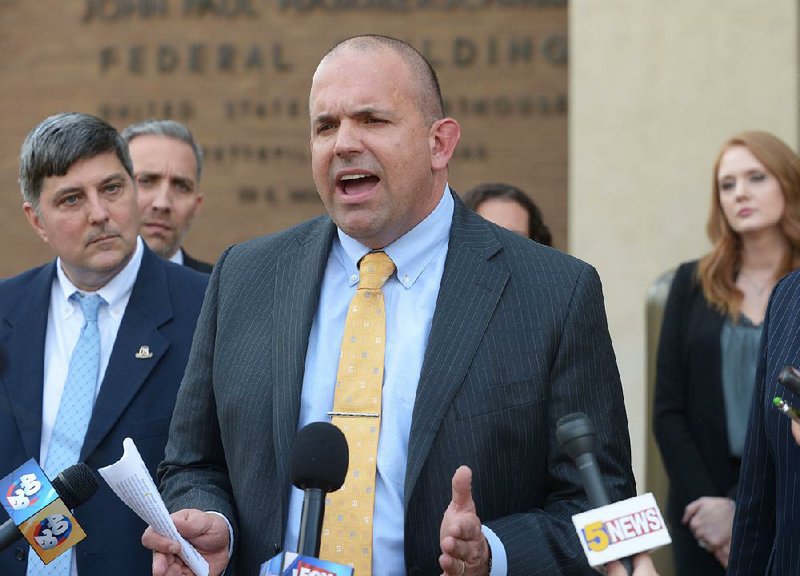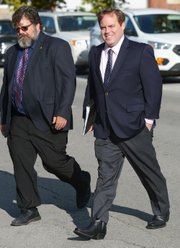FAYETTEVILLE -- Jon Woods used to boast the best lodgings at the Capitol Hill Apartments, his rooms bestrewn with costly sports memorabilia, according to court testimony in April. He displayed the best-stocked liquor cabinet in that home away from home for state legislators across the street from the Capitol.
The state senator from Springdale didn't drink, according to the testimony at his trial. The liquor and the snacks stuffing the pantries refreshed other lawmakers and associates while deals were cut. Some of those deals reaped illegal kickbacks to Woods.
Wednesday, U.S. District Judge Timothy L. Brooks sentenced Woods to 18 years and four months in federal prison. In addition, Woods will spend three years on probation after his prison sentence, pay $1.6 million in restitution and forfeit $1 million in assets to the federal government.
Woods' month-long trial found him guilty May 3 of 15 charges of corruption for taking kickbacks from state grants he approved. The charges consisted of one count of conspiracy to commit fraud, one of money laundering in the purchase of a cashier's check, and 13 of mail or wire fraud.
Woods declined to testify on his own behalf or make a statement during the proceedings. He sat without stirring, facing forward throughout the judge's remarks on the factors in his sentencing, an explanation lasting more than a half-hour. He and his legal team left after the proceedings without comment, but his attorney said during the hearing there will be an appeal.
Woods is a first-time offender, but his crimes show a high level of sophistication and eagerness to profit off the public's trust, Brooks told Woods on why he was rejecting his request for leniency.
"I think your mentality has evolved to the point that I think you have some serious criminal mentality issues" and would return to fraudulent behavior if given a light sentence, the judge told Woods.
Woods convinced other legislators to grant money to those paying him kickbacks, prosecutors said.
"How many other legislators were deceived?" U.S. Attorney Duane "Dak" Kees argued during Woods' sentencing hearing, which lasted almost five hours. Woods deeply betrayed the trust of both the public and his peers, Kees said. In at least one case, he corrupted fellow lawmaker Rep. Micah Neal and brought him into the scheme, Kees said.
Financial woes
Testimony and evidence during his trial drew a much different picture of Woods than the lavish lifestyle his fellow lawmakers witnessed.
Financial records showed Woods took out loans and then more loans to pay the preceding loans while juggling at least four checking accounts that often registered negative balances. He spent $39,000 on fine jewelry with money he didn't have, those records showed.
Fellow lawmaker and Springdale High School alum Neal testified he looked at Woods' lifestyle and asked him how he made money. Woods revealed a plan a little while later in which the two would steer state grant money to a small Christian college in Springdale and a nonprofit Bentonville company in exchange for a 20 percent kickback, Neal said.
Neal's turn for sentencing is next week, one year and nine months after he pleaded guilty to one count of conspiracy.
Randell Shelton Jr. of Kemp, Texas, the best man at Woods' June 14, 2014, wedding, will receive his sentence today for 12 counts of the same crimes in the same scheme. Woods' wife, Christina, signed the papers to file for divorce the day before Woods was convicted, Oklahoma court records show.
Woods did a great deal of good and was effective as a legislator, said past officers of associations for both firefighters and police at the hearing. At least a dozen people, including a lawmaker whose name wasn't released by Brooks, wrote letters of support for leniency in sentencing to Brooks, the judge said.
"Jon would always greet people, and especially go to those who are not popular, who the rest of the world has discarded," the Rev. Keith Castleman of the Baldwin Church of Christ in Fayetteville testified. The fact Woods sought out the "little guy" was a recurring theme in letters to the judge, Brooks said.
Sophisticated schemes
The kickback schemes were sophisticated and took skill to execute, Brooks said.
"You were playing chess at a very high level, thinking three or four or five moves ahead. This wasn't a case of someone offering you a chance to make easy money and you taking it."
Federal sentencing guidelines allowed Brooks to impose a sentence of more than 33 years at the maximum, but that was excessive, the judge said. Woods remains free on bond until he reports Sept. 26 to whatever federal prison the U.S. Justice Department sends him.
Woods was convicted in kickback schemes involving Ecclesia College, a small, private Christian school in Springdale, and a Bentonville-based nonprofit group called AmeriWorks. He received kickbacks on $350,000 in state General Improvement Fund grants he directed to Ecclesia and $275,000 in grants he sent to AmeriWorks. Prosecutors didn't specify how much money Woods received in kickbacks because all but a $40,000 wire transfer was paid in cash, they said.
Shelton and Woods were indicted in March 2017. A co-conspirator, Oren Paris III, former president of Ecclesia, pleaded guilty April 4 to one count of conspiracy. He resigned as Ecclesia's president before his guilty plea. His sentencing is set for next week.
Paris disguised the kickbacks as consulting fees paid to Shelton's business, Paradigm Strategic Consulting, according to the indictment. Shelton then passed the money along to Woods and Neal.
Woods' corruption involved more than kickbacks, according to testimony and court documents. He would sponsor and pass legislation to benefit Ecclesia. He would draft and sometimes introduce other legislation to benefit his benefactors, including a plan he pitched to Gov. Asa Hutchinson in 2015 to legalize medical marijuana to support Ecclesia College. He drafted a bill to direct state grants to a shingle recycling business owned in part by himself, Shelton and Paris, according to court documents.
Woods' then-fiancee was hired at a behavioral health provider that received a $1 million state grant Woods sponsored, and his invalid father received medical equipment bought with another state grant by a company in Benton, according to court records.
The big grant
The most brazen act of all, according to Brooks at the hearing, came after lobbyist, behavioral health services executive and convicted bribe-payer Milton R. "Rusty" Cranford returned a $400,000 state grant Woods had helped sponsor in September 2014 after federal investigators questioned him about it.
"Your immediate, almost reflexive response was to re-steal the same money," by putting it in another grant to get another kickback, Brooks told Woods. "I find that amazing. I find that a great insight into the depravity of your heart."
Although the charges against Woods were for kickback schemes involving Ecclesia and that $400,000 grant to AmeriWorks, a company Cranford ran, it was the $1 million state grant in 2013 to the behavioral health provider, Alternative Opportunities, that weighed heavily in his sentence, according to court proceedings.
Alternative Opportunities is now known as Preferred Family Healthcare. The Springfield, Mo.-based nonprofit group lost its state contracts and Medicaid credentials this year as a result of the ongoing scandal that started with Neal's guilty plea and resulted in five convictions of former state lawmakers so far, along with the indictment Friday of a sixth.
Cranford pleaded guilty earlier this year to paying bribes to Woods and others to get the grant passed in Act 791 of 2013. So in effect, years were added to Woods' sentence for a crime he was never convicted of and has only been implicated in by a convicted felon, argued Patrick Benca of Little Rock, Woods' attorney.
"My concern is that you have a guy facing more time in prison for an accusation from someone who was not present at trial," Benca said. "There was no way to confront Mr. Cranford at trial, no test of his credibility in front of a jury. It's unfair."
Act 791 originally authorized a $2 million grant to Alternative Opportunities, but then-Gov. Mike Beebe and then-state Department of Human Services Director John Selig both balked at Alternative Opportunities getting such a large amount with no competitive bidding requirements, according to testimony at the hearing by IRS agent John Munns.
In the end, Alternative Opportunities got $1 million of the grant money -- and another company that used Cranford as a lobbyist got much of the rest, Munns testified.
'Legislative ATM'
Testimony at Woods' trial in April painted a picture of a man who appeared wealthy, but operated on the edge of insolvency.
"Mr. Woods used his office as senator as a legislative ATM," Sean Mulryne, attorney for the public integrity section of the U.S. Department of Justice, said during the trial.
Woods borrowed $35,000 from a payday lender in the two years before the kickback scheme began. The businessman testified he didn't know Woods introduced legislation in 2011 to benefit payday lending and would introduce another bill to benefit such lenders in 2013, he testified.
The loan wasn't repaid until October 2013.
Woods' financial records show he made cash deposits to various accounts of his totaling $82,488 from 2012 through 2015. That includes $24,877 in 2013 and $37,782 in 2014, bank records show. This compares to $3,700 in 2012 and $16,138 in 2015, according to testimony from Christy Cops, fraud research specialist for Arvest Bank where Woods kept his accounts.
Woods took out $87,250 in loans from Arvest Bank between 2012 and 2014, all guaranteed by local businessmen. Testimony by government witnesses showed Woods consolidated those loans, a $52,000 balance on a car loan and other debts into a $165,000 loan from Signature Bank in June 2015.
Bank records showed Woods had at least four checking accounts and failed to consistently maintain a positive balance in any of them, according to Cops' testimony. Records also showed as many as 16 overdraft penalties a month in one of his accounts in 2013, Cops testified.
Crandall Streett, a loan manager for Signature Bank, testified Woods was having to pay late fees on this debt consolidation loan with that bank by October 2015.
Woods grew up in Springdale and graduated from the University of Arkansas with a degree in marketing in 2002. He was working as a loan officer at a bank when first elected to the state House in 2006. He served three terms in the state House before defeating incumbent Sen. Bill Pritchard, R-Elkins, in 2012.
He didn't run for re-election in 2016, but collected the largest amount of per diem, mileage and other expense payments among senators that year at $33,692.
NW News on 09/06/2018


